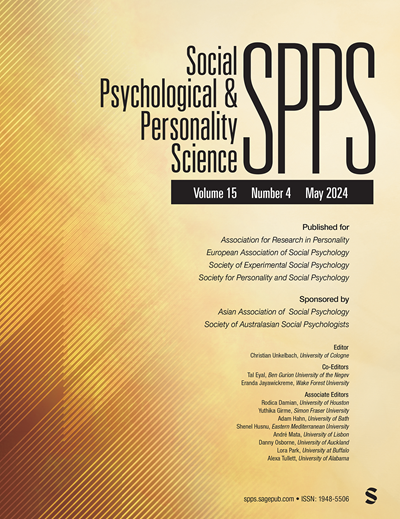容易犯罪的当权者不那么腐败吗?来自两个在线实验的证据
IF 3.3
2区 心理学
Q1 PSYCHOLOGY, SOCIAL
引用次数: 0
摘要
贿赂在人类社会中无处不在。然而,我们仍然不知道掌权者的受贿行为和潜在的心理过程是如何受到内疚倾向(一种与道德相关的重要人格特质)的影响的,以及这种特质-行为的关联是如何取决于贿赂带来的危害显著性的。为了解决这些问题,我们进行了两个在线实验(Ntotal = 2082),将经济游戏与个性测量相结合。实验1表明,高度内疚倾向的个体不太愿意接受贿赂,尤其是当涉及到更高的伤害显著性时。实验2采用参数化设计和计算模型,证实了伤害显著性的调节作用,揭示了“关心他人痛苦”这一关键心理结构在特质-行为关联中的中介作用。总之,这些发现证明了内疚倾向在遏制受贿行为方面的关键作用,并表明对他人痛苦的关注是一种潜在的心理机制。本文章由计算机程序翻译,如有差异,请以英文原文为准。
Are Guilt-Prone Power-Holders Less Corrupt? Evidence From Two Online Experiments
Bribery is ubiquitous in human society. Yet it remains unknown how bribe-taking behaviors of power-holders and underlying psychological processes are affected by guilt-proneness, a crucial moral-related personality trait, and how this trait–behavior association depends on harm salience brought by bribery. To address these questions, we conducted two online experiments ( Ntotal = 2, 082) combining economic games with personality measures. Experiment 1 showed that highly guilt-prone individuals were less willing to take bribes, especially when higher harm salience was involved. Leveraging a parametric design with computational modeling, Experiment 2 confirmed the moderation effect of harm salience, and revealed a mediation role of the concern for others’ suffering, a key psychological construct in the trait–behavior association. Together, these findings demonstrate a critical function of guilt-proneness in curbing bribe-taking behaviors and suggest the concern for others’ suffering as an underlying psychological mechanism.
求助全文
通过发布文献求助,成功后即可免费获取论文全文。
去求助
来源期刊

Social Psychological and Personality Science
PSYCHOLOGY, SOCIAL-
CiteScore
12.50
自引率
1.80%
发文量
77
期刊介绍:
Social Psychological and Personality Science (SPPS) is a distinctive journal in the fields of social and personality psychology that focuses on publishing brief empirical study reports, typically limited to 5000 words. The journal's mission is to disseminate research that significantly contributes to the advancement of social psychological and personality science. It welcomes submissions that introduce new theories, present empirical data, propose innovative methods, or offer a combination of these elements. SPPS also places a high value on replication studies, giving them serious consideration regardless of whether they confirm or challenge the original findings, with a particular emphasis on replications of studies initially published in SPPS. The journal is committed to a rapid review and publication process, ensuring that research can swiftly enter the scientific discourse and become an integral part of ongoing academic conversations.
 求助内容:
求助内容: 应助结果提醒方式:
应助结果提醒方式:


